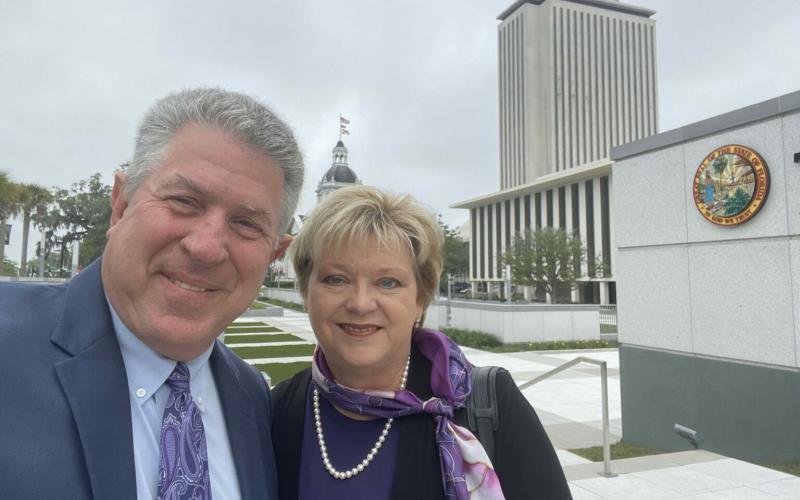As Janet and Doug Adkins live with the unimaginable loss of their daughter, Emily, they are working through their grief by creating something positive – the hope that they can prevent other families from suffering a similar loss.
Emily Adkins died last October of a blood clot, which is a treatable condition that went undetected. After gall bladder surgery in August, she fell and broke her ankle in September. In October, she had her ankle cast removed, given a “boot” and told to exercise. She was readying to leave her parents’ home in Fernandina Beach, where she had been staying during her recovery, to her new home in Yulee, where she had just fenced in the back yard in preparation for getting a dog.
Emily Adkins had asthma, the symptoms of which are much like a pulmonary embolism. She had some breathing issues and used her inhaler. The next day, she was working and coworkers noticed her voice was raspy and called her mother, Janet, who called 911. Emergency responders arrived about 5:20 p.m. and she opened the door for them. They found her on the floor in cardiac arrest. She was revived in the ambulance on the way to Baptist Nassau, where she went back into cardiac arrest and could not be revived.
Doug Adkins said she was never told or warned about blood clot risks or to be on the lookout for certain symptoms that could suggest a blood clot was present.
“She had a family history of blood clots, she was a little overweight, she had recently had surgery and had been immobilized for four weeks in a cast,” Adkins said. “All of those things are risk factors. In essence, the train is coming at you, you need to have a blood clot prevention plan when you meet all those risk factors.”
Even a simple screening known as a calf squeeze, which is simply squeezing a patient’s calves to screen for a clot, can show evaluation for a blood clot. But Emily Adkins’s doctors did not screen or perform any tests that would indicate a blood clot, Doug Adkins said.
There is no protocol to screen and prevent blood clots, he said.
“Right now there are competing standards of care for screening patients with blood clots,” Doug Adkins said. “You have confusion and disarray and conflicting positions about what to do for patients that are at risk for blood clots. For me, this is a life-and-death matter, and we, as a state, owe it to the citizens of Florida to create that standard of care.”
Toward that end, Janet and Doug Adkins initiated a measure that resulted in Senate Bill 612 and House Bill 483, known as the Emily Adkins Prevention Act. Filed by Sen. Clay Yarborough, it greenlights a volunteer effort to examine the prevention of deaths from blood clots and was passed 40-0 in the Senate. A version of the bill has already won broad bipartisan support in the House, and the Adkinses were going to Tallahassee Tuesday, when it would be brought to the House floor. Rep. Dean Black sponsored the bill in the House. As a former representative, Janet Adkins planned to use her privilege to speak about the bill.
That willingness to examine standards of care and their enforcement could well extend to Gov. Ron DeSantis, whose sister, Christina DeSantis, 30, died in 2015 of an embolism stemming from a blood clot.
While working at the capitol, Doug Adkins said people have shared stories of how their lives have been touched by blood clots, such as a high school athlete who broke a bone and died a week later from a clot or the friend of a young mother who approached Janet and Doug Adkins.
“She was in tears because, finally, we are talking about this in Florida,” Doug Adkins said. “She said her best friend had given birth and died a week later. She had to carry the infant to its mother’s funeral.”
Which, sadly, is not uncommon; blood clots are a leading cause of death in a woman during pregnancy or just after having a baby, according to the CDC. As many as 100,000 people die of blood clots each year, one in four of those people with no warning. Blood clots are a leading cause of death in people with cancer after the cancer itself.
If passed in the House, the Emily Adkins Prevention Act will require the Secretary of Health Care Administration and the State Surgeon General to establish a policy workgroup to understand how blood clots and pulmonary emboli affect the lives of Floridians.
The workgroup will consider recommendations regarding standard of care guidelines and determine how many Florida residents are affected. It would identify how data is collected, identify emerging treatments and therapies and develop a recommendation for risk surveillance systems.
The speaker of the House and Senate president will each appoint two people to the workgroup, Doug Adkins said, and the surgeon general will appoint the chair. The group will have advocates and experts and subcommittees to carry out some of the work to determine how this is affecting Floridians. The Agency for Healthcare Administration and Department of Health will be involved.
Leslie Lake, volunteer president of the National Blood Clot Alliance, spoke before the Florida Senate in support of the bill. She hopes more states will follow Florida’s lead.
“Florida is the first state in the country to take on blood clots, and it won’t be the last,” she said. “We will be eagerly watching the outcomes in Florida as we rally other states to adopt similar measures.”
The workgroup will issue its final report on Jan. 4, 2025, which is Emily Adkins’s 25th birthday, Doug Adkins said, as a gift to her.
“She believed in accountability and following the rules, and if there aren’t good rules, to create the structure and rules and framework to allow people to succeed,” he said.
Janet and Doug Adkins have also founded a nonprofit, Emily’s Promise, which offers $5,000 scholarships to medical students and is sponsoring three people to visit Israel with Blackrock Baptist Church. They will support kindness efforts, as “Emily was full of kindness,” and Doug Adkins said he hopes to promote kindness as a community value and help heal the division in society.
Emily Adkins was many things, a Fernandina Beach and UNF graduate and the People Success Officer at Doug Adkins’s senior care facilities, Dayspring Village and Dayspring Senior Living, where she was slated to take the reins after her father.
She loved politics and was active in campaigns and elections, loved her church family at Blackrock Baptist Church, was a big fan of Marvel movies and anime, a voracious reader and a world traveler who had visited Israel, Italy, the United Kingdom, Canada, Mexico, Austria, Switzerland, Germany, Denmark, Holland, France and Belize.
Doug Adkins said his family’s efforts are simple: to put in place a plan to save others from Emily Adkins’s fate.
“Out of the anguish that we are going through, where our heart is, is to try to do something to prevent another family from going through the anguish that we live every day,”
he said. “If we can just help prevent one other from going through this, it would be enough for us.”
jroberts@fbnewsleader.com





